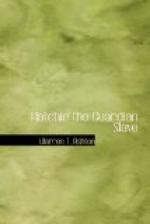His first step, on returning to the steamer, was to destroy the letters he had written to meet the worst calamity which might befall him. Having occasion to open his trunk, he discovered, to his surprise, that it was unlocked. Further examination showed that he had been robbed of all his earthly possessions. This was a severe blow. The money was the accumulation of two years’ service, and he was now penniless,—without even a sufficient sum to pay his passage. He immediately informed the captain of his loss, who gave him the comfortable assurance that the robber had probably gone ashore at Natchez. However, he caused a thorough search of the boat to be made; but, as may be supposed, the search was vain.
Uncle Nathan sympathized with him in his loss,—not with words alone, but voluntarily proposed to lend him any amount he required; an offer which Henry accepted with gratitude.
“I see you are acquainted with that lady you saved from drowning,” said the worthy farmer, after he had passed the loan to Henry. The duel had before been discussed and roundly condemned. The cause of the quarrel had introduced the fact to which the farmer had alluded.
“I am. Her father was my best friend. I spent a few weeks with him a short time before his death.”
“O, ho!” thought Uncle Nathan, “I guess the black feller didn’t know that, or he would have given the papers to him;” and he resolved to inform Hatchie of Henry’s presence.
Descending, he soon discovered Pat Fegan, and, by his help, was enabled to hold a conference with Hatchie, who, now that it was daylight, talked through a crevice in his box.
Hatchie was anxious to know the result of the duel, which Uncle Nathan imparted, to whom, in return, the mulatto related the means he had used to foil the attorney’s purpose, which was nothing less than murder. He also disclosed the particulars of the second plot, which was to be put in execution that night.
The information the faithful slave had gained in relation to the character of Henry’s efforts for his mistress made him quite willing to have him admitted into the confidence of her secret protectors.
Uncle Nathan returned to the cabin, delighted with the idea of sharing his responsibility with Henry. But his first wish was to relieve the distress of Emily, who, he rightly judged, was in continued suffering, on account of the painful uncertainty which shrouded her destiny.
Emily rose on the morning of the duel in blissful ignorance of the danger which Henry had incurred on her account. She had passed a sleepless night, in the most intense agony. Her eyes were red and swollen with weeping, and her heart yet beat with the violence of her emotions. She felt in the most intense degree the misery of her situation, to which she failed not to give all its weight. She had a friend—a brother—more than brother—near, in the person of Henry. That love which she allowed her fond heart to cherish was like an oasis in the desert of her misery. She loved him, and in this thought—in the delightful sensation which accompanied it—she found her only solace.




